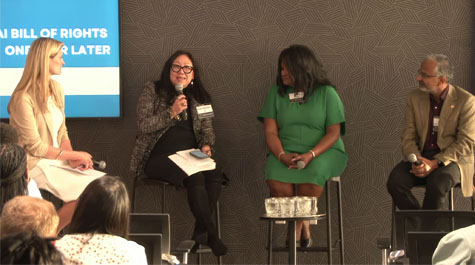Digital Democracy Lab Holds D.C. Event to Examine Blueprint for AI Bill of Rights
The Digital Democracy Lab at William & Mary Law School recently helped coordinate a conversation at William & Mary’s Washington Center that explored the impact of the White House Office of Science and Technology Policy’s (OSTP) Blueprint for an AI Bill of Rights one year after its release.
The event was cohosted on October 3 by William & Mary Data Science as well as the offices of the President and Provost, and held in partnership with two think tanks, Data & Society and the Center for Democracy & Technology, and co-sponsored by several units across William & Mary.
Panelists included two of the Blueprint’s team of co-authors at the OSTP, Sorelle Friedler and Dr. Suresh Venkatasubramanian, as well as Lisa Rice, President and CEO of the National Fair Housing Alliance, and Margaret Hu, Taylor Reveley Research Professor and Professor of Law and Director of the Digital Democracy Lab at William & Mary Law School.
“Multiple technological and policy developments occurred since the release of the Blueprint,” Hu said. “It was exciting that the Lab had the opportunity to cohost this event to explore the potential of the Blueprint to shape future policymaking and legislative action.”
Watch the Conversation.
Emma Battin, a second-year William & Mary Law student, attended the event in person.
“On the one-year anniversary of the release of the Blueprint for an AI Bill of Rights, it was a privilege, as a William & Mary Law student, to be able to participate in a conversation on its principles and its impact,” Battin said.
The Digital Democracy Lab will continue to convene conferences and events to help students consider how best to reinforce democracy and the rule of law in a rapidly evolving technological landscape. In March 2024, for example, the Law School will cohost a conference on AI and national security together with William & Mary’s Whole of Government Center and others.
“William & Mary Law students, in line with our citizen lawyer tradition, are interested in addressing the types of digital and AI challenges that have the potential to make our democracy more fragile, such as algorithmic discrimination and disinformation campaigns,” Hu said. “The Lab encourages students to consider their present and future role in addressing those challenges.”
Learn more about the Digital Democracy Lab.
